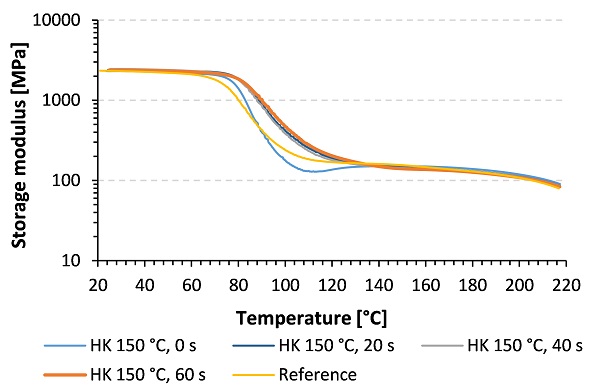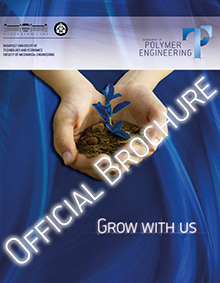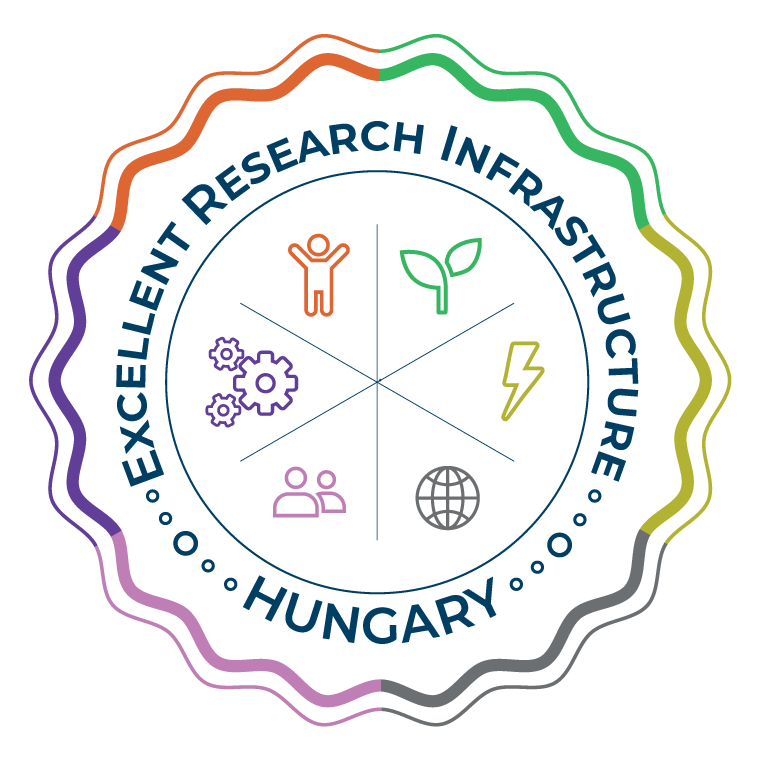Development of PET packaging with increased heat resistance through waste recovery

Dr. Dániel Gere
Dr. Ákos Pomázi
Prof. Dr. Andrea Toldy
Dr. László Mészáros
Dr. Roland Petrény
Zsófia Kovács
Dr. Gábor Romhány
Dániel István Poór
László József Varga
Dr. György Marosi
Tamás Igricz
The project GINOP_PLUSZ-2.1.1-21-2022-00041 was implemented with the co-financing of the European Union.
Project summary
The vast majority of PET packaging, currently available on the market, has an amorphous structure (APET) and therefore their heat resistance is limited. The coronavirus epidemic further increased the need for crystalline PET (CPET) packaging with resistance to high-temperature, which also allows the improvement of food safety and preparation of foods with increased gastronomic value by baking. However, such raw materials can only be obtained in original form at high prices. The aim of the project is to develop formulations that enable the production of PET packaging materials meeting the increased application requirements at a lower cost, with value-added waste recovery (in the light of structural features that provide properties for higher expectations). This way we can develop a new kind of thermoformed product able to be heated up in an oven with its ready meal content, that has high heat stability and contains significant amount of recycled material. This will be possible based on the new finding outlined in the consortium members’ joint patent application, which results in a significant improvement in the properties of low-quality waste by a reactive method and a well-controlled process. The technology improvement activity includes methodological development of real-time sensor-information (e.g. adaptation of machine vision), which also serves the wider development of digitization in the industry. Our further aim is to investigate how the recyclability of high-temperature CPET trays made by the process can be solved for conventional heat-resistant and highly heat-resistant products depending on the additives and technological characteristics used in recycling, thus ensuring that the developed products can be fully integrated into the circular economy model. Increased interest in heat-resistant packaging targeting more demanding consumption has sparked international competition for an expanded market, but this is hampered by the high price of CPET. Significant advantage can be achieved in profitability if an innovative process manages to meet the quality requirements at a lower price. However, such a method is not known excepting the applicant’s invention, which provides priority protection and thus profitability of the products made using it. The indirect target group of the business plan is the demanding young consumers in Western Europe, but there is a visible trend of increasing expectation in Central Europe too, primarily with regard to food safety, which the products to be developed can provide at an outstanding level. Our main competitors are the few plastics processing companies in Western Europe (e.g. Faerch A/S in Denmark and Versatile Packaging in Ireland), mostly in the Far East and the United States, which already produce high-temperature trays for heating and baking semi-finished foods, but these products are still made of expensive industrial materials and not from cost-effective secondary raw materials (requiring appropriate treatment and technological features). With an average income of HUF 132 m, the results of the project can be calculated on an annual basis, so the return on the project is ensured within 4 years. Both the proportion of secondary raw materials used in the production of high-temperature products and the high recyclability factor ensure the long-term sustainability of the project result, as the project idea itself comes from a patent-based recognition whose protection gives us a long-term technological and price advantage. Our potential customers will consist of our current partners, other new food production and packaging companies as direct users, and we see significant potential in global distribution companies providing complex packaging systems, even in Hungary (e.g. KREIS Pack and Bunzl). Main aims of the project: Developing crystalline PET (CPET) formulations: developing formulations of CPET packaging materials that meet high heat resistance and food safety requirements. Development of CPET trays: based on the new formulations, development of CPET trays with high heat resistance and containing secondary (recycled) raw materials, suitable for heating ready meals in the oven. Investigating recycling: investigating the potential for recycling high-temperature CPET trays for conventional heat-resistant and high-temperature products, depending on the additives and technological parameters used in the recycling process, to ensure that the products can be integrated into a circular economy model.
Project results

Project-related publications
- Krizsma Sz. G., Suplicz A., Gere D.: Customised production of injection moulded parts from recycled materials using rapid tooling approach and coupled injection moulding-thermal and mechanical simulation. Results in Engineering, 26, 105272/1-105272/15 (2025) https://doi.org/10.1016/j.rineng.2025.105272 IF=6 D1
- Ronkay F., Gere D., Slezák E., Szabó E., Marosi Gy., Bocz K.: Recycled PET packaging materials of improved toughness— Importance of devitrification of the rigid amorphous fraction. Macromolecular Materials and Engineering, 310, 2400219/1-2400219/9 (2025) 10.1002/mame.202400219 IF=4.2 Q2
- Tatár B., Homlok R., Mészáros L.: Enhancing the shape memory performance of self-reinforced cross-linked polyethylene composites by the optimization of the production temperature. Nuclear Engineering and Technology, 57, 103617/1-103617/8 (2025) 10.1016/j.net.2025.103617
- Ronkay F., Slezák E., Gere D., Lukács N., Gyalai-Korpos M., Molnár A. D., Bocz K.: Thermoanalytical approach to assess riverine PET litter and its recycling potential. Scientific Reports, 15, 15673/1-15673/12 (2025) 10.1038/s41598-025-94925-y IF=3.8 Q1
- Slezák E., Ronkay F., Réz D., Bocz K.: Recyclability of elastomer toughened recycled poly(ethylene terephthalate): The effect of grinding-extrusion-injection moulding on the mechanical and morphological properties of the blend. Heliyon, 10, e32096/1-e32096/1-13 (2024) 10.1016/j.heliyon.2024.e32096 IF=3.4 Q1
- Tatár B., Mészáros L.: Shape memory characteristics of injection molded poly(lactic acid) multiscale hybrid composites. ACS Omega, 9, 46960-46967 (2024) 10.1021/acsomega.4c06592
- Tóth L., Slezák E., Bordácsné Bocz K., Ronkay F. Gy.: Progress in 3D printing of recycled PET. Materials Today Sustainability, 26, 100757/1-100757/12 (2024) 10.1016/j.mtsust.2024.100757 IF=7.1 Q1
- Lukács N., Ronkay F., Molnár B., Marosfői B., Bocz K.: Characterisation of flame retarded recycled PET foams produced by batch foaming. Polymer Testing, 124, 108104/1-108104/9 (2023) 10.1016/j.polymertesting.2023.108104 IF=5 D1
- Bocz K., Ronkay F. Gy., Vadas D., Molnár B., Gere D., Czigány T., Marosi Gy.: Flame retardancy of PET foams manufactured from bottle waste. Journal of Thermal Analysis and Calorimetry, 148, 217-228 (2023) 10.1007/s10973-022-11423-3 IF=3 Q2
- Slezák E., Ronkay F., Bocz K.: Development of an engineering material with increased impact strength and heat resistance from recycled PET. Journal of Polymers and the Environment, 31, 5296-5308 (2023) 10.1007/s10924-023-02945-4
- Lukács N., Decsov K. E., Molnár B., Ronkay F., Bocz K.: Increased processing temperature assisted reactive toughening of poly(lactic acid). Express Polymer Letters, 17, 169-180 (2023) 10.3144/expresspolymlett.2023.12 IF=2.7 Q2
- Slezák E., Ronkay F., Bocz K.: Improvement of mechanical properties of recycled PET by reactive toughening and post-crystallization. Acta Technica Jaurinensis, 15, 193-198 (2022) 10.14513/actatechjaur.00680
- Ronkay F., Molnár B., Szabó E., Marosi Gy., Bocz K.: Water boosts reactive toughening of PET. Polymer Degradation and Stability, 203, 110052/1-110052/9 (2022) 10.1016/j.polymdegradstab.2022.110052 IF=5.9 D1






